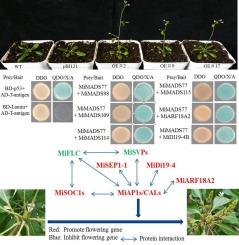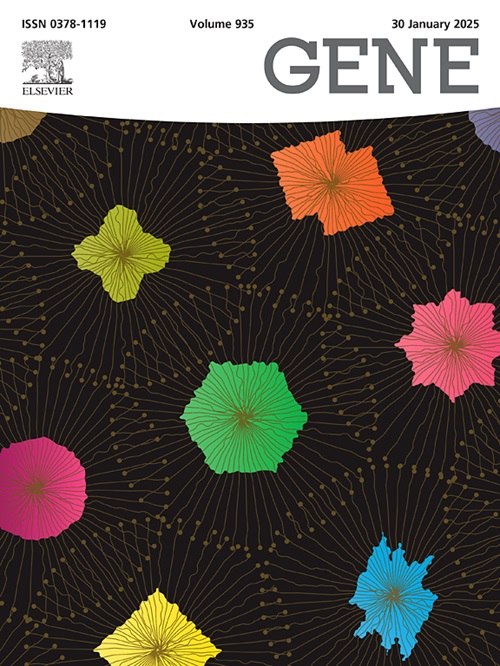芒果中 MADS-box 基因家族的全基因组分析以及拟南芥中 MiMADS77 的异位表达导致提早开花。
IF 2.6
3区 生物学
Q2 GENETICS & HEREDITY
引用次数: 0
摘要
芒果(Mangifera indica L.)是一种重要的热带水果,适时开花和坐果对芒果生产非常重要。MADS-box 基因家族参与调控植物的花诱导、花器官规格化和果实发育。对 MADS-box 基因家族的鉴定和分析可为研究芒果开花和果实发育的分子机制奠定基础。本研究根据基因组和转录组数据鉴定了 119 个 MiMADS-box 基因。系统进化分析表明,这些基因可分为两类。41 个 I 型蛋白被进一步划分为三个亚家族,78 个 II 型蛋白被进一步划分为 11 个亚家族。发现了几对替代剪接基因,尤其是在 CONSTANS 1(SOC1)亚家族中。MiMADS-box 基因分布在 20 条芒果染色体中的 18 条上。顺式元件分析表明,在芒果 MiMADS-box 基因的启动子区域存在许多光、胁迫和激素响应元件。表达模式分析显示,这些基因在芒果的多个组织中都有不同程度的表达。高表达的 MiMADS77 随后被转化到拟南芥中,结果导致拟南芥明显早花和花器官异常。酵母双杂交(Y2H)试验发现,MiMADS77 与多个 MiMADS-box 蛋白相互作用。此外,我们还在相关研究的基础上初步构建了芒果中 MADS-box 基因的开花调控网络。这些结果表明,MiMADS77基因可能参与了芒果的开花调控。本文章由计算机程序翻译,如有差异,请以英文原文为准。

Genome-wide analysis of the MADS-box gene family in mango and ectopic expression of MiMADS77 in Arabidopsis results in early flowering
Mango (Mangifera indica L.) is an important tropical fruit, and timely flowering and fruit setting are very important for mango production. The MADS-box gene family is involved in the regulation of flower induction, floral organ specification, and fruit development in plants. The identification and analysis of the MADS-box gene family can lay a foundation for the study of the molecular mechanism of flowering and fruit development in mango. In this study, 119 MiMADS-box genes were identified on the basis of genome and transcriptome data. Phylogenetic analysis revealed that these genes can be divided into two classes. Forty-one type I proteins were further divided into three subfamilies, and seventy-eight type II proteins were further classified into eleven subfamilies. Several pairs of alternative splicing genes were found, especially in the SUPPRESSOR OF OVEREXPRESSION OF CONSTANS 1 (SOC1) subfamily. The MiMADS-box genes were distributed on 18 out of the 20 mango chromosomes. Cis-element analysis revealed many light-, stress-, and hormone-responsive elements in the promoter regions of the mango MiMADS-box genes. Expression pattern analysis revealed that these genes were differentially expressed in multiple tissues in mango. The highly expressed MiMADS77 was subsequently transformed into Arabidopsis, resulting in significant early flowering and abnormal floral organs. Yeast two-hybrid (Y2H) assays revealed that MiMADS77 interacts with several MiMADS-box proteins. In addition, we constructed a preliminary flowering regulatory network of MADS-box genes in mango on the basis of related studies. These results suggest that MiMADS77 genes may be involved in flowering regulation of mango.
求助全文
通过发布文献求助,成功后即可免费获取论文全文。
去求助
来源期刊

Gene
生物-遗传学
CiteScore
6.10
自引率
2.90%
发文量
718
审稿时长
42 days
期刊介绍:
Gene publishes papers that focus on the regulation, expression, function and evolution of genes in all biological contexts, including all prokaryotic and eukaryotic organisms, as well as viruses.
 求助内容:
求助内容: 应助结果提醒方式:
应助结果提醒方式:


